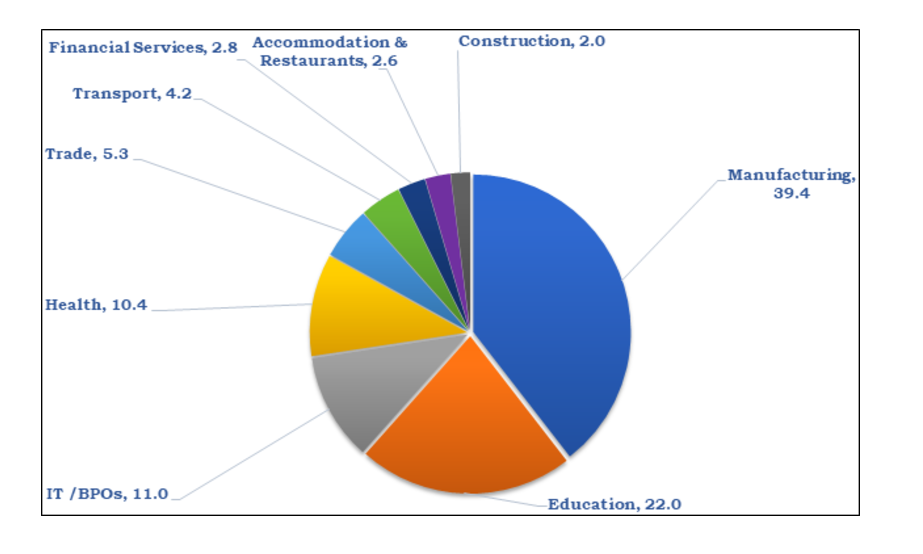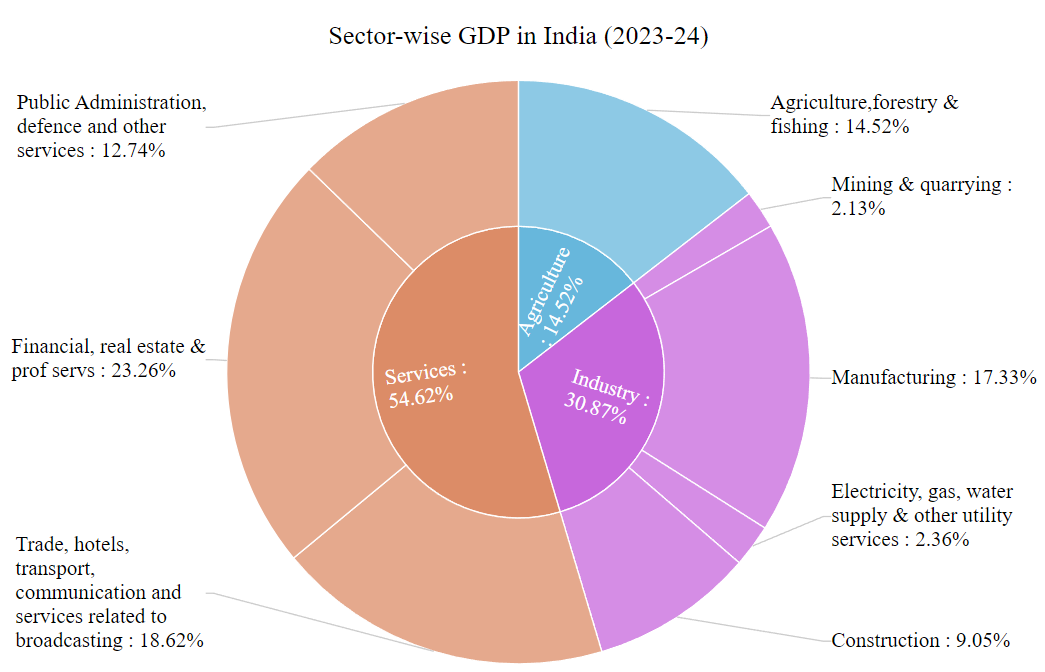Narayan Murthy’s statement advocating a 70-hour workweek has ignited widespread debate among India’s workforce. As a billionaire with a nation-building perspective, Murthy compared India’s work culture to that of economic superpowers like China. While many workers expressed outrage, especially on social media, labor unions labeled the suggestion as illegal.
Lets explore the issue from multiple perspective
Employment statistics in India
India’s key employment sectors include Agriculture , Mining , Information Technology, and many more. These sectors employ millions ranging from Drivers in transport sector to software developers in IT.

Sector wise contribution to GDP of the country:
The service sector ranks in contributing to the GDP with GVA of 267.62 lakh crore Indian rupees. followed by Industry sector with GVA of Rs. 73.93 lakh crore. While Agriculture and allied sector share third with 2.3 lakh Crore.

The Cheapest labor wages.
India has the cheapest labor globally, with annual wages averaging $674. In comparison, China’s minimum annual wage is $2,642—nearly four times higher
Population wise India has surpassed China with the total population of 1,450,940,000 in 2024 while China is still the second highest populated country in the world with a population of 1,419,320,000.
Per Capita INCOME
Per capita income (PCI) is the average income per person in a specific area, such as a city, country, or region. It's calculated by dividing the total income in an area by its population:
China has a significantly higher per capita income compared to India; with China's per capita income being roughly 2.5 times higher than India's, meaning for every dollar of per capita income in India, China has around 2.5 dollars.
- China's per capita income: Around $12,600
- India's per capita income: Around $2,500
70 hour work-week from the eyes of Billionaire and Industry leaders
The statement made by Mr. Murthy didn’t just receive criticism but also received support from Bhavesh Agarwal of Ola. Many founder came in support and agreed to the statement that, It is essential for younger generation to work 70 hours per week for the purpose of country’s growth. As India is competing with Economic superpowers like China and US.
Why does the employees and employers have a split reaction. it is not just because the founders get richer as their employees work harder. It is because the founders are use to putting more than 70 every week to build their empires. That’s what makes them Top 1%. It’s hard to build intuitions ; generational wealth , and so does showing up every day and working odd hours.
India currently the 5th largest economy in the world has a positive future if the opportunity is used correctly. The number of young generation joining the workforce in India is more than any country in the world ; people below the age of 29. This can be as advantageous as it can be or as disastrous as it could turn . Keeping in mind the unemployment and inflation rates and market conditions.
The Divided Workforce: Beyond Billionaire Benefits
The contrasting reactions stem from more than just founders reaping financial rewards while employees toil for long hours. Founders often dedicate far more than 70 hours a week building their empires, which sets them apart. Building institutions and generational wealth requires constant dedication and a willingness to work unconventional hours.
India, currently the world's 5th largest economy, has a promising future if it leverages its opportunities wisely. The nation boasts the highest number of young people entering the workforce globally, with a significant portion being under 29. This young demographic presents both advantages and potential drawbacks, especially considering unemployment rates, inflation, and market conditions.
Impact of 70-Hour work week
Health Concerns:
Doctors has criticized the 70 hour work week by stating that there is a fair amount of medical evidence that this 70 hour work week will lead to increased incidents of cardiovascular descries, like strokes , heart attack , and blood pressure. `
Work life Balance:
Mr. Murthy mentioned that he doesn’t believe in work-life balance concept to which Bhavesh Agarwal supported. The fact people show up to work place every days is their work life balance. Workers are humans they live with their family. They are bound to take care of them selves and their families.
On contrary when employee of an organization is unable to work anymore due to unforeseen circumstances. The company lists the vacancy for that post within 24 hours for replacement.
Compensation/ salary :
People are getting paid the minimum wage in the world and expected to work maximum hours to increase companies profits. India is one among the cheapest labors available in the world.
Gender Inequality: This also raise question on the gender inequality in both the ways. Only 32% of women participate in India’s labor force. Mandating a 70-hour workweek could worsen gender inequality, whether women are forced to work extended hours or exempted, potentially leading to wage disparities.
If the women are exempted from this rule it will discriminate them by fetching wages lesser than that of men.
Impact on physical and mental health : Although Neurologists and Doctor have a different stance on this that 70 hour work week can be achieved but not advisable. A man is a social animal , it is important for humans to have life out side work, socialize , spend time with families , exercise, travel , sleep for 6-8 hours ,explore the world. If not done it will not just cause hormonal imbalance, make you a recipient of chronic diseases in a young age .
Exploitation and ethical considerations:
exploitation by definition is the abuse of workers for the sake of profits. being paid less or asked to work long hours , laying off employees with out prior notice or employees being tightly controlled. Anything the employee are forced to do that challenges the ethical conduct counts under exploitation.
Employees perspective:
Indians still has to work hard to earn their bread . Putting long hours every day , staying loyal to the company, sometimes overtime sometimes weekends. only for that sense of satisfaction on salary day. On which government takes its cut in the name of tax.
Mistaking more hours to more productivity by the employers; Instead it’s other way around more relaxed mind that tends to more productivity.
Encouraging a toxic work culture or a toxic manager will kill the teams productivity of employees. Expecting employees to show-up in such a culture is insane.
Employees deserve some share of the success from the company’s growth. If employees doesn’t grow along with the company; they start looking for other companies to work.
Conclusion:
The debate surrounding a 70-hour workweek in India is multifaceted. While industry leaders advocate for increased productivity and global competitiveness, it’s crucial to consider the potential negative consequences for workers’ health, well-being, and work-life balance.
A balanced approach is essential. Prioritizing efficiency, innovation, and employee well-being should be the focus, rather than simply equating longer work hours with increased productivity. A healthy and motivated workforce is ultimately more productive than one that is overworked and stressed.
As India continues to evolve as a global economic power, it’s imperative to strike a balance between economic growth and social welfare. A sustainable work culture that values both productivity and employee well-being is essential for India’s long-term success.
The 70-Hour Workweek Debate